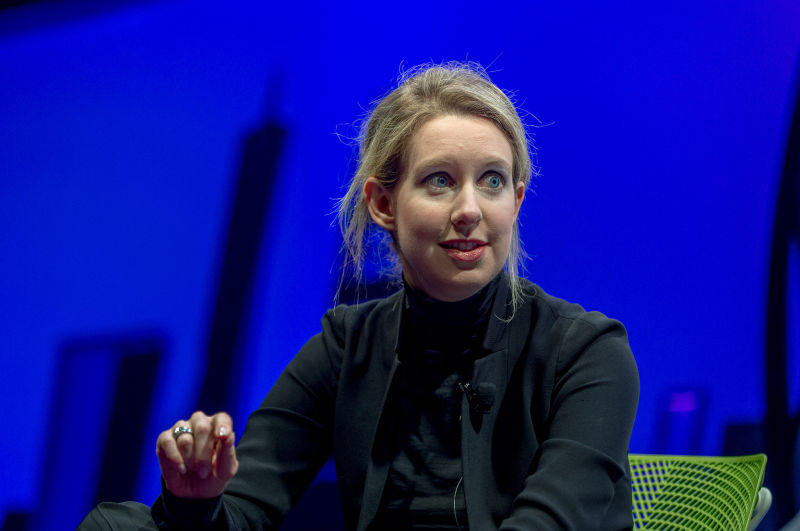If Theranos is found to be out of compliance with CMS standards, then it could potentially be decertified and barred from Medicare and Medicaid. Decertifications are rare, and providers are usually given the right to correct deficiencies.The paper said the inspection findings were "about to be made public." A spokesperson for CMS told KQED in an email the agency could not say when the report will be released. Theranos did not respond to a request for comment but told the Journal it had not yet seen the report.
The Journal story is reporter John Carreyrou's latest bubble-deflating piece on Palo Alto-based Theranos. The company, founded in 2003 by 19-year-old Elizabeth Holmes, was once the epitome of a "disruptive" high-flying health care startup, introducing diagnostic tests that required only a pinprick's worth of blood.
Last year, the private firm was valued at $9 billion, and Fortune called Holmes the "world's youngest female billionaire" (she'll be 32 next week).
But over the past several months, the story of Theranos has taken an unpleasant turn. Last October, the FDA said Theranos vials ("nanotainers"), which collect the blood from patients' fingers, had been improperly listed by the company as exempt from FDA review and approval. The FDA also said Theranos had inadequate procedures for reviewing complaints — including those suggesting the devices may be faulty.
Meanwhile, The Wall Street Journal reported Theranos was having a lot of problems with its breakthrough technology:
One former senior employee says Theranos was routinely using the device, named Edison after the prolific inventor, for only 15 tests in December 2014. Some employees were leery about the machine’s accuracy, according to the former employees and emails reviewed by The Wall Street Journal.
In a complaint to regulators, one Theranos employee accused the company of failing to report test results that raised questions about the precision of the Edison system. Such a failure could be a violation of federal rules for laboratories, the former employee said.
Theranos also hasn’t disclosed publicly that it does the vast majority of its tests with traditional machines bought from companies like Siemens AG.
Theranos stopped using Edison for all but one of the 200 tests it lists. In late December, the Journal published another article with more revelations, including an alleged incident in which managers at the company deleted data from a quality control test to make Edison's results appear more accurate than they really were, sending the faulty results to the patient.
A spokesperson for Theranos told the Journal the company did not believe the incident occurred.
Walgreens, meanwhile, has put on hold plans to expand the Theranos stations it hosts in dozens of stores in three states.
As the Journal has published its reports, Theranos has issued a string of responses denouncing the accuracy of the stories. The latest statement is from Dec. 21, in the form of a letter to the Journal's editor.
The Journal has relied almost entirely on anonymous sources – without disclosing those sources’ qualifications, biases, affiliations, motives, or even how recently they were employed. Theranos has not only made its top scientists and engineers available to the Journal, but has provided exhaustive information and on-the-record statements to address every allegation raised by the Journal. ...
By continually relying on mostly anonymous sources, while dismissing concrete facts, documents, and expert scientists and engineers in the field provided by Theranos, the Journal denies its readers the ability to scrutinize and weigh the sources’ identities, motives, and the veracity of their statements.
But last October, Christina Farr, reporting for Future of You, wrote frankly about the skepticism surrounding Theranos beyond that of The Wall Street Journal's:
(S)ome scientists and health writers saw past the hype months ago. They took to their personal blogs and social media to ask some pertinent questions about the science behind Theranos’ test, which largely went unanswered. Some requested that Theranos publish peer-reviewed studies to prove the validity of its test.
At health conferences and gatherings, I’ve heard similar skepticism about Theranos’ science and its multi-billion dollar valuation, as well as increasing calls for proof to back up its claims. Theranos has sought FDA approval for its tests, but it has evaded questions about its technology.
As Dr. David Koch, president of the American Association for Clinical Chemistry and a professor at Emory University told Business Insider in April: “It’s impossible to comment on how good this is going to be — it may be wonderful and it may bomb, but I really can’t be more definitive because there’s nothing to really look at, to read, to react to.”
More, we're quite sure, to come...

